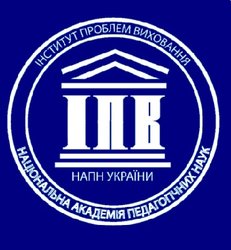Institute of Problems on Education of the National Academy of Educational Sciences of Ukraine
Basic information

Subordination
USREOU
Kind of institution
Scientific directions of activity
Foundation date
Country
City
Types of scientific and technical activity
Дослідження та розробки в галузі педагогічних наукSubtypes of scientific and technical activities
Педагогічні наукиDescription
The subject of scientific research of the Institute provides for the development of fundamental theoretical and methodological aspects of the educational process and the actual problems of modernizing its content, updating the forms and methods of educating children and young students. A feature of the scientific activity of the Institute is the integrated research of innovative personality-oriented technologies aimed at the moral and spiritual development of the individual in the preschool and school period of his life.
The Institute is a well-known institution responsible for modernizing the content, humanizing goals, modernizing the educational technologies of family, preschool, physical, labor, moral, environmental and aesthetic education. Its activities are carried out on the basis of the logic of the development of the theory of education, as well as taking into account the social order of the Ministry of Education and Science of Ukraine and other interested institutions.
The Institute provides educational services to applicants for education at the third (educational and scientific) level, conducts trainings in national-patriotic and civic education. Doctoral and postgraduate studies work at the Institute, there is a specialized academic council for the defense of doctoral and master's theses.
The Institute is the founder of periodic scientific publications: a collection of scientific papers "Theoretical and methodological problems of raising children and students" and the journal "Art and Education" (special editions).
Currently, promising areas for further research by the Institute of Educational Problems of the National Academy of Educational Sciences of Ukraine are:
• education of children of early and preschool age;
• national-patriotic, civic and intercultural education of children and youth;
• formation of physical activity and a healthy lifestyle;
• polyartistic personality development;
• education of the personality in a safe and open environment of children's, youth associations and educational institutions;
• innovative technologies of socio-pedagogical assistance to vulnerable groups of the population;
• the educational potential of out-of-school education in the development of individual competencies, environmental education of children and youth in the context of ensuring the sustainable development of society.